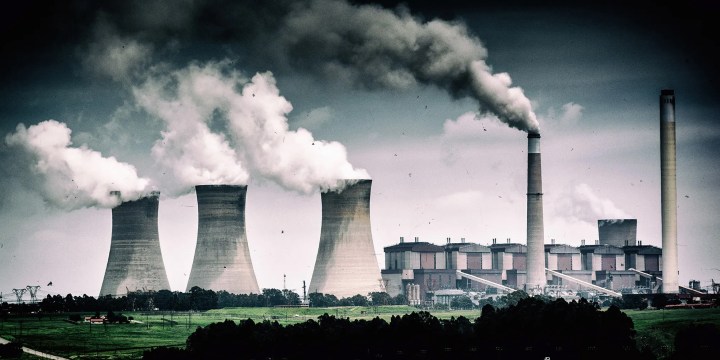BENEATH THE DUST
Coal’s deadly toll — Mpumalanga community members share their experiences of sickness and suffering

Sharing their experiences of living in the shadows of Mpumalanga’s coal mines and power stations, community members and activists said that the health impacts of coal use are vastly understated and not widely understood on all levels.
Giving testimonies in a town hall in Cape Town on Wednesday, community members and affected groups that live in and around Mpumalanga’s coal power stations and mines said that the health impacts of mining, processing and burning coal are greatly understated by political leaders and widely misunderstood and understated by residents themselves.
The testimonies were shared at Open Secrets’ “The People’s Hearing on Energy Profiteers” event. Open Secrets explains that the event was meant to be a “platform for affected communities, activists and civil society experts to advocate for the prioritisation of human and environmental rights in the efforts to address the energy crisis and the climate crisis”.
Addressing the crowd, Happy Skosana, a member of the Middelburg Social and Environmental Justice Alliance (Mseja) explained that community members are not often aware of the adverse impacts of the industrial activities around them.
“We’ve got a lot of mines, maybe we are surrounded with plus minus 50 mines, we’ve got power stations, we’ve got manufacturing, for example, steel and alloys companies surrounding us. All of that it’s a coal value chain industry. Now, what we are doing, we run around the community. Our community, they don’t have correct information about what coal is really doing to our life.”
Skosana explained that despite the claims of the mining companies and political leaders, the unemployment rate is persistently high even with activity along the coal value chain. He made the argument that some of the unemployment may actually be a result of that same economic activity.
“With that [being said], it’’s not because they are not skilled, not because they are not educated, but because they are sick. Our people, they are sick,” he said.
“We are having a tendency that these diseases, especially respiratory diseases, [are considered an] inheritance into a family.
He continued “We are saying people, they must know the truth that coal dust — it’s affecting us. Because everyone wants to work at the mine, everyone wants to work in this industry but the pollution, the real reason that we are sick is the pollution that we are having. No one is talking about that.”
Rights and education
The solution, Skosana explained, was in educating people and advocating for community members to assert their constitutional rights.
“Section 24 gives us our rights, that we have got the right to a healthy environment,” said Skosana.
Section 24 of the Constitution of South Africa affirms that “Everyone has the right to an environment that is not harmful to their health or well-being; and to have the environment protected, for the benefit of present and future generations, through reasonable legislative and other measures that prevent pollution and ecological degradation; promote conservation; and secure ecologically sustainable development and use of natural resources while promoting justifiable economic and social development.”
Daily Maverick reported in October last year that a report from the Centre for Research on Energy and Clean Air (Crea) found that if the decommissioning of SA’s coal plants only begins in 2030 or beyond, it would cause a projected 15,300 excess air pollution-related deaths and economic costs of R345-billion.
Before that, a 2017 study by UK-based air quality and health expert Mike Holland, who visited the South African coal belt, found that air pollution from coal-fired power stations killed more than 2,200 South Africans every year, and caused thousands of cases of bronchitis and asthma in adults and children annually.
Read more in Daily Maverick: More than 15,000 excess deaths feared if SA further deviates from plan to shut coal-fired power plants – study
Responding to Daily Maverick, Professor Rebecca Garland, Associate Professor in the Department of Geography, Geoinformatics & Meteorology at the University of Pretoria who has a background in atmospheric science, with a focus on air quality and climate change explained why coal and air pollution more generally can be such a bane to communities.
“Where we have measurements within the highveld priority area…we do know that pollution levels are high and that they exceed national ambient air quality standards. The pollutants that often exceed the standards are particulate matter (PM) and ozone.”
Garland explained that they aren’t the only pollutants and that the sources are often varied. She also explained some of the health impacts, noting that she is not a public health researcher; the impacts of air pollution on human health are well understood.
“It depends on the pollutant but they tend to focus on the respiratory system. Air pollution can impact on respiratory health. A large solution is the implementation and ensuring that the just energy transition takes place in a responsible way and ensuring the air quality futures are considered in this transition.”
Skosana, in an earlier echo of Garland’s point about the just transition at the Open Secrets’ event, said “We want our community to realise the need for a just transition. We want them to realise that we need a clean environment, a green energy. This electricity currently it’s not meant for us, it’s meant for business. We want the electricity that will be sustainable and guaranteed for people, not for the business. This is what we want to do. We want people to take a stand and say ‘we want just transition’ and a just transition that will be done carefully and not having a negative impact to our community. We want the just transition that will address health issues, address unemployment issues, that’s the just transition that we want.” DM



















Comments - Please login in order to comment.